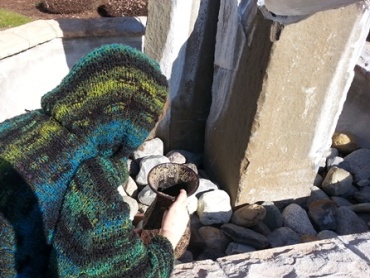
It is our pleasure here at Ishshah’s Story to welcome back author and blogger Linda Jo Reed of the U.S. The following guest post, her second contribution to the blog, offers an engaging retelling of the Samaritan woman – the woman at the well.
Linda Jo’s first story, Upheld in Life Change, can be enjoyed again here.
♦♦♦
In The Middle Of The Day
John 4:4-30
What’s in a Name?
In the middle of the day, an unnamed woman met Jesus. He was to her, a strange man, at the well where she drew water. Her life changed. I would like to tell her story, but I think everyone should have a name. I’m calling her Miriam because this is any woman—a common name. More than that, Miriam means “bitter,” and it’s possible this woman’s life could have been bitter.
Miriam’s Story
Miriam came to the well at noon every day. But today, her steps faltered. Her jug felt especially heavy on her shoulder. A man sat at the well. Why was He there? Drawing water was women’s work! And not only a man, but a Jewish man! With no love lost between Jews and Samaritans, how could it be that a Jewish man stood by Jacob’s Well in Samaritan territory—in the middle of the day?
Since He was alone and Miriam needed water, she breathed deeply and stepped up to the well. Keeping her head down, she lowered her jug.
“Would you be so kind as to give me a drink?”
Miriam froze. She looked right, then left before lifting her head to look at the Jewish stranger. She nearly gasped. He was gazing straight at her. Men didn’t look at women!
She couldn’t help herself. She asked, “How is it that you, being a Jew, ask a drink from me, a Samaritan woman? For Jews have no dealings with Samaritans.” She couldn’t keep the incredulity out of her voice.
Thus began a discussion concerning the history of the well, the difference in how Jews and Samaritans worship and when the talk turned personal, Miriam got uncomfortable. She shifted her feet and blew hair away from her face.
Finally, she said, “I know that Messiah is coming and when He does He will tell us all things.” There, that should stop this uncomfortable conversation and she could finish drawing water and hasten back home.
But as she lifted her jug, she saw compassion in His eyes and paused. He said to her, “I who speak to you am He.”
Time stood still for Miriam. What did He say? She gazed at Him and He steadfastly gazed right back and she saw love in His eyes. Her spirit soared and her thirst fled. Instead an excitement she had not known in years expanded in her chest.
As more men joined the Messiah, Miriam forgot her waterpot, turned and ran for the village as fast as she could. No thought of rejection slowed her down, she only thought of Messiah.
“Come, everyone, see a Man who told me all the things that I ever did. Could this be Messiah?” And they came.

God, In His Love, Pursues Us
This story tells us a great deal about love. The Scripture says, “But He needed to go through Samaria.” How strange. The woman spoke truly. Jews hated Samaritans and went out of their way to avoid them.
Most of the time, Jesus and His crew would have walked right around Samaria in their travels, yet He “needed” to go through Samaria.
Jesus knew Miriam would be at the well at noon. He knew this woman was desperate for love. Jesus also knew her heart would be ready to receive Him. Because of her thirst for love and friendship, she was prepared for His visit.
Today, we may not meet up with a stranger while we draw water at a well, but life offers us many places to come face to face with our own brokenness and loneliness. Jesus will meet us there. He pursues us with a great love; and no matter where our lifestyle has taken us in our search for love—He will be there. He knows our hearts and He loves us.
We Love God because He First Loved Us
How do we respond to the love of God? Maybe we, like Miriam, have tried to divert God’s attention away from parts of our lives we didn’t want Him to mess with. We squirm. It often takes that gaze of Jesus into our souls to bring the conviction to us that opens our hearts and ears.
Humbling ourselves allows the Holy Spirit to labor and complete His work in us. He’s an Artist creating a fine tapestry, picking just the right color, texture, floss to weave. He takes our every broken part, the memories that don’t go away and shapes it all. He’s not only forming the piece that we are, but where we fit into His big picture.
 We learn to fix our eyes on Him.
We learn to fix our eyes on Him.
We listen for His Voice in the deep parts of our souls and minds.
He’s given us His Word to meditate upon.
We obey what He says and let Him weave us into place.
We let go of the futile trail we chose for ourselves and He will spiritually hold our hands along the new path. Suffering may be part of it, but with purpose.
When we set out to please Him, His delight in us is breathtaking. He will stop at nothing to help us succeed. This brings Him glory. Forever, we enjoy the deepest love-relationship with Him.
Reward: Loving Others
When we love God we want to please Him. And what better way to please Him than to love those He loves, treat them kindly with grace and mercy. That would include those who don’t yet know Him. When Jesus revealed Himself as Messiah, Miriam’s first reaction was to go tell people and bring them to Him.
What a wonderful reward to be blessed in relationships!
But sometimes old loves and friendships are too broken to be restored. Is there still a reward? Yes! Jesus will introduce us to new people to love: people He has redeemed and whose lives have been woven into His tapestry along with ours. He thinks of everything!
So, dip deep into the well of His love. He needed to come for us. Our thirst is great, but His love satisfies. It’s the middle of the day. He is waiting there for you and me. He’s not going away until we come. ♦


Thanks for this! This is one of my favorite stories. There is so much depth to it and we often miss it because we don’t know the context (both scriptural and historical).
LikeLike
Appreciative of your stopping by and validating the telling of this wonderful story in scripture. Thank you, P3 and you’re welcome!
LikeLike
Are you familiar with the wedding imagery John includes into the story?
LikeLike
Since this post was written by a guest contributor, we can’t answer for her. However, we invite you to share your insight. Thanks for your interest, P3.
LikeLike
Sorry, totally spaced that. My “insight” would take up too much space but in a nutshell, John is using courtship and marriage allusions to the Old Testament in chapter 4. I can provide a link, if that’s okay.
LikeLike
Thank you, P3. I am delighted that this story touched you as it did. Yes, I agree, sometimes we miss the depth. Perhaps because we don’t know the context, and I think we get very busy in our lives. We read the Scripture and then run to our to do’s instead of mining the depths. Thank you for the reminder to go deeper. Linda Jo Reed (guest author of post)
LikeLike
Indeed!
LikeLike